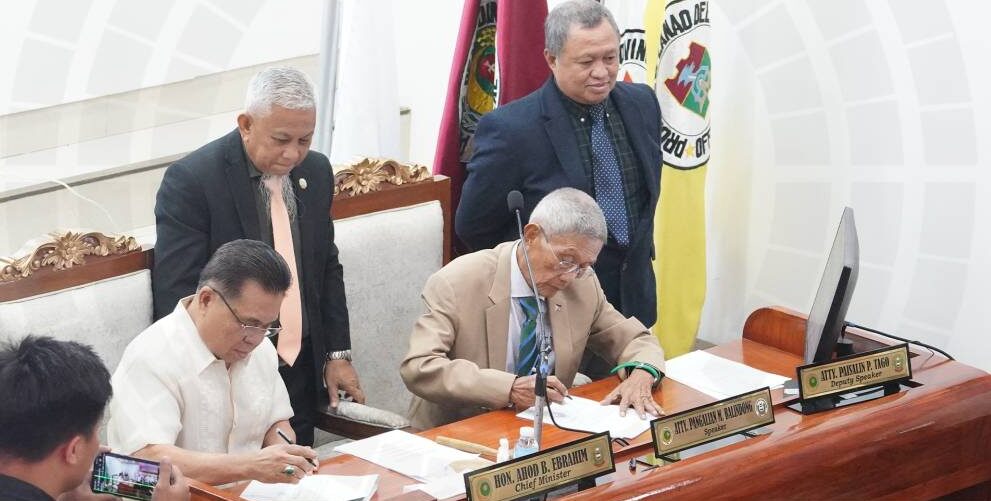With crucial law passed, BARMM set for first regular polls

IMPORTANT MEASURE Bangsamoro Autonomous Region in Muslim Mindanao Chief Minister Ahod “Al Haj Murad” Ebrahim (left) signs into law the measure creating 32 parliamentary districts in the region. At right is Bangsamoro Parliament Speaker Pangalian Balindong. —PHOTO COURTESY OF BANGSAMORO TRANSITION AUTHORITY
COTABATO CITY—The Bangsamoro Parliament passed on Wednesday a measure creating 32 parliamentary districts, completing the preparations for the holding of the first regular parliamentary elections in the region in 2025.
Bangsamoro Autonomous Region in Muslim Mindanao (BARMM) Chief Minister Ahod “Al Haj Murad” Ebrahim signed the measure into law on Wednesday night after it was passed through 47 affirmative votes with one opposition and three abstentions.
“Thank you very much for working hard and working on time; you were able to pass this very important bill,” Ebrahim told parliament members during the law’s signing ceremony held about an hour after it was approved on the floor.
The measure was introduced in December last year, and was certified by Ebrahim as a priority legislation.
Bangsamoro Autonomy Act No. 58 (Act Providing for the Creation of Parliamentary Districts in BARMM) is the last piece needed to ensure that the elections will finally push through.
Floor leader and committee on rules chair Sha Elijah Dumama-Alba said the approval of the measure marked the region’s “readiness for the first parliamentary elections in 2025.”
Organized in 2019 right after the ratification of the Bangsamoro Organic Law (BOL), the three-year institutional life of the current Bangsamoro Transition Authority was extended to 2025 in order to give it time to work on key legislations that lay the foundation for effective autonomy.
The interim parliament had already passed the Bangsamoro Electoral Code that defines the process for electing its officials.
Speaking before the parliament in 2022, President Marcos told the Bangsamoro legislators to ensure that elections push through in 2025 as he did not want another round of extension of the transition period.
Under the BOL, 40 of the 80-member regional legislature will be filled by representatives from parties who won seats through a regionwide vote—32 by representatives of elected parliamentary districts, and eight by representatives of several sectors, including indigenous peoples.
Fair representation
In a statement, the parliament leadership said the newly enacted law will serve as the foundational framework for the delineation of the parliamentary districts, aimed at ensuring fair representation for the diverse needs and concerns of the Bangsamoro people.
During public consultations, most local leaders and sector representatives in the BARMM asked lawmakers to add at least one more district seat each for more representation of their localities in the regional legislature.
But the original version of the measure prevailed, with the authors noting that the Moro people had to live with the reality that only 32 seats would be available, based on the BOL.
The law allows three district representatives to the parliament from Basilan, seven from Sulu, three from Tawi-Tawi, four each from Maguindanao del Norte and Maguindanao del Sur, eight from Lanao del Sur, two from Cotabato City and one from the Special Geographic Area which comprise 63 villages of Cotabato province that joined the BARMM.
District representatives will be elected through majority votes, requiring voters to be registered in the respective district.
Individuals aspiring to become district representatives must meet specific criteria, including being a registered voter in the said district and having resided in the same area for at least one year.
The division of parliamentary districts is based on both population and geographical area, with each district consisting of contiguous, compact and adjacent areas with a minimum population of 100,000.
Speaker Pangalian Balindong said he was confident the distribution of seats was fair to all constituent localities.
The Bangsamoro region comprises six provinces, three cities, 116 municipalities and 2,590 barangays, and is home to over four million residents.